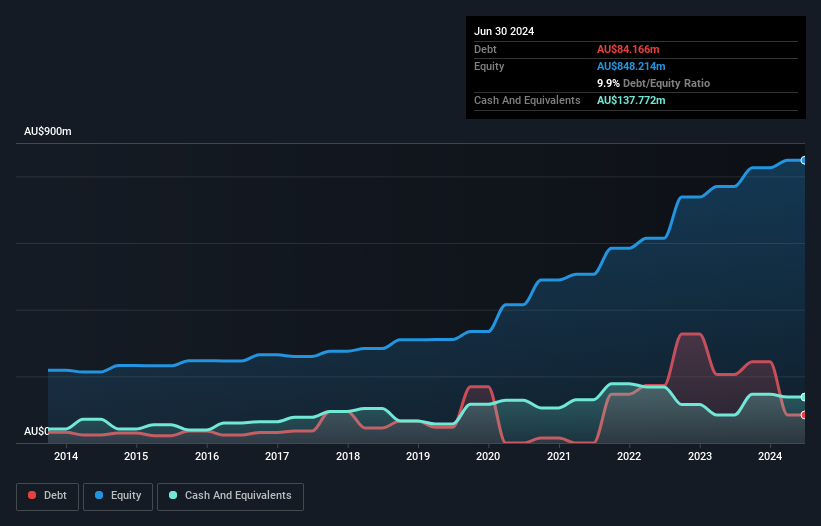
Legendary fund manager Li Lu (who Charlie Munger backed) once said, 'The biggest investment risk is not the volatility of prices, but whether you will suffer a permanent loss of capital.' So it might be obvious that you need to consider debt, when you think about how risky any given stock is, because too much debt can sink a company. We note that Breville Group Limited (ASX:BRG) does have debt on its balance sheet. But the real question is whether this debt is making the company risky.
When Is Debt A Problem?
Generally speaking, debt only becomes a real problem when a company can't easily pay it off, either by raising capital or with its own cash flow. In the worst case scenario, a company can go bankrupt if it cannot pay its creditors. However, a more usual (but still expensive) situation is where a company must dilute shareholders at a cheap share price simply to get debt under control. Of course, plenty of companies use debt to fund growth, without any negative consequences. When we think about a company's use of debt, we first look at cash and debt together.
View our latest analysis for Breville Group
How Much Debt Does Breville Group Carry?
You can click the graphic below for the historical numbers, but it shows that Breville Group had AU$84.2m of debt in June 2024, down from AU$205.4m, one year before. However, its balance sheet shows it holds AU$137.8m in cash, so it actually has AU$53.6m net cash.

How Strong Is Breville Group's Balance Sheet?
Zooming in on the latest balance sheet data, we can see that Breville Group had liabilities of AU$337.9m due within 12 months and liabilities of AU$154.9m due beyond that. Offsetting this, it had AU$137.8m in cash and AU$253.6m in receivables that were due within 12 months. So it has liabilities totalling AU$101.5m more than its cash and near-term receivables, combined.
Given Breville Group has a market capitalization of AU$5.05b, it's hard to believe these liabilities pose much threat. Having said that, it's clear that we should continue to monitor its balance sheet, lest it change for the worse. While it does have liabilities worth noting, Breville Group also has more cash than debt, so we're pretty confident it can manage its debt safely.
Fortunately, Breville Group grew its EBIT by 7.5% in the last year, making that debt load look even more manageable. The balance sheet is clearly the area to focus on when you are analysing debt. But ultimately the future profitability of the business will decide if Breville Group can strengthen its balance sheet over time. So if you want to see what the professionals think, you might find this free report on analyst profit forecasts to be interesting.
But our final consideration is also important, because a company cannot pay debt with paper profits; it needs cold hard cash. Breville Group may have net cash on the balance sheet, but it is still interesting to look at how well the business converts its earnings before interest and tax (EBIT) to free cash flow, because that will influence both its need for, and its capacity to manage debt. In the last three years, Breville Group's free cash flow amounted to 38% of its EBIT, less than we'd expect. That's not great, when it comes to paying down debt.
Summing Up
We could understand if investors are concerned about Breville Group's liabilities, but we can be reassured by the fact it has has net cash of AU$53.6m. On top of that, it increased its EBIT by 7.5% in the last twelve months. So we are not troubled with Breville Group's debt use. When analysing debt levels, the balance sheet is the obvious place to start. But ultimately, every company can contain risks that exist outside of the balance sheet. For instance, we've identified 1 warning sign for Breville Group that you should be aware of.
If you're interested in investing in businesses that can grow profits without the burden of debt, then check out this free list of growing businesses that have net cash on the balance sheet.
Valuation is complex, but we're here to simplify it.
Discover if Breville Group might be undervalued or overvalued with our detailed analysis, featuring fair value estimates, potential risks, dividends, insider trades, and its financial condition.
Access Free AnalysisHave feedback on this article? Concerned about the content? Get in touch with us directly. Alternatively, email editorial-team (at) simplywallst.com.
This article by Simply Wall St is general in nature. We provide commentary based on historical data and analyst forecasts only using an unbiased methodology and our articles are not intended to be financial advice. It does not constitute a recommendation to buy or sell any stock, and does not take account of your objectives, or your financial situation. We aim to bring you long-term focused analysis driven by fundamental data. Note that our analysis may not factor in the latest price-sensitive company announcements or qualitative material. Simply Wall St has no position in any stocks mentioned.
About ASX:BRG
Breville Group
Designs, develops, markets, and distributes small electrical kitchen appliances in the consumer products industry in the Americas, Europe, the Middle East, Africa, and the Asia Pacific.
Flawless balance sheet with solid track record.
Similar Companies
Market Insights
Community Narratives




